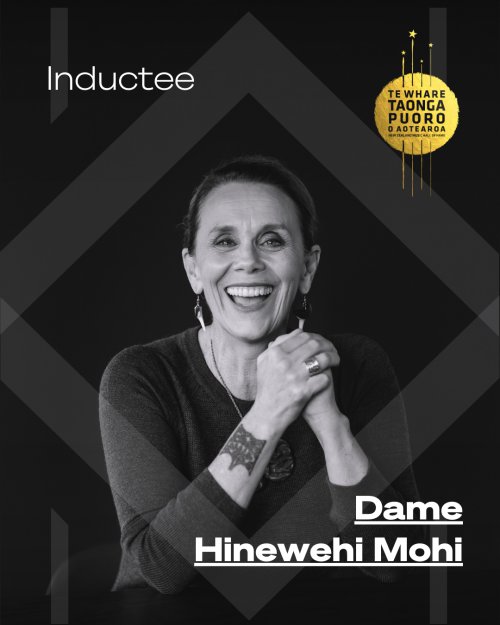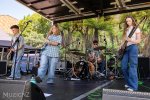Music News - Dame Hinewehi Mohi announced as Recorded Music NZ 2024 NZ Music Hall of Fame inductee

18 May 2024 - 0 Comments
“Music is empowering. It is a way for us to connect to our language, our culture, and to each other.”
25 years since the release of Jaz Coleman produced debut album Oceania
25 years since Māori national anthem at the Rugby World Cup at Twickenham
20th anniversary of the establishment of the Raukatauri Music Therapy Trust
5th anniversary of Waiata Anthems
Many people have been exposed to and learnt te reo Māori because of Dame Hinewehi Mohi (Ngāti Kahungunu, Ngāi Tūhoe). Hinewehi learnt te reo Māori because of her dad.
Having grown up with parents who were of the generations banned from speaking Māori at school – and punished physically if they did so – Mike Mohi and his siblings weren’t taught Māori as children. At age 30, he chose to reclaim his birthright and connect with his cultural identity, an aspiration he held for his own tamariki too.
Hinewehi was 10 at the time and became immersed in te reo through daily lessons with her father – which he always kept one step ahead of – and through listening to vinyl records of waiata reo Māori, such as Inia Te Wiata and the Māori Theatre Chorus, that he’d play at the whānau home in Central Hawke’s Bay to help familiarise everyone with the sound of the language.
In the 1970's, to learn Māori was unusual. Te Petihana Reo Māori | the Māori Language Petition was presented to Parliament in 1972, calling for the recognition and revitalisation of te reo Māori after more than a century – and the implications and impacts – of that policy. Along with many others who wore the effects of intergenerational language trauma, Mike Mohi reached for the zeitgeist – calling for change, and language and cultural reclamation.
It was from this seed that Hinewehi grew into an advocate for the day-to-day use of te reo Māori in Aotearoa, and an inadvertent – yet intentional – activist. Taken aback by the controversy that erupted after she sang God Defend New Zealand in te reo Māori at a Rugby World Cup match at Twickenham in 1999, the artist became a catalyst for change. Her performance sparked renewed debate around the use of te reo in Aotearoa, and ultimately normalised the singing of our national song in both Māori and English.
She went on to build a truly remarkable career and was appointed a Dame Companion of the New Zealand Order of Merit for her services to Māori, music, and television in 2021.
While the struggle for recognition and respect of tangata whenua and te reo Māori continues, the revitalisation movement also continues to strengthen and grow. Dame Hinewehi has been a central figure in keeping it moving forward, particularly in the world of music.
Beyond that much-told tale of Twickenham 25 years ago, Hinewehi’s legacy is vast. Currently holding the role of Manukura Puoro Māori at APRA AMCOS NZ, Dame Hinewehi advocates for the growth of Māori music and the development of a bilingual music industry in Aotearoa.
Prior to that, Dame Hinewehi ran her own company Raukatauri Productions, and is an experienced video content producer, creating more than 1,000 hours of content to support the revitalisation of the Māori language and culture, with a particular focus on waiata reo Māori.
Five years ago, Dame Hinewehi initiated the Waiata Anthems project supporting artists to record their hit songs in Māori.
“I bumped into [Universal Music head] Adam Holt at the 2018 Vodafone NZ Music Awards,” Mohi says, explaining how the project came about. “I’d had this idea to translate much loved songs into Māori, with the artists singing them. I’ve never stopped thinking about music, and how it connects us, even though I was working in TV and digital content production, making programmes about waiata, and continuing that side of what I loved in my production work.
“Adam pulled the Universal artists together, and Kim Boshier gathered the Sony artists. It was an honour to work alongside Sir Tīmoti Kāretu who translated the songs, before I reworked the Māori lyrics to the existing melodies. It also started the most incredible journey, working with the artists – most of them who’d never sung in Māori before. I completely underestimated what an impact it would have for them personally, being reconnected to their language, their culture, and whakapapa in this way. For many it was lifechanging and I feel so privileged to have been a part of it.
Released in 2019, the first Waiata Anthems album featured the likes of Six60, Stan Walker, Bic Runga, TEEKS, Drax Project, and BENEE. It debuted at #1 on the Official NZ Music Charts and went on to spend 27 weeks in the Top40. It was #1 on the NZTop20 Album chart for three weeks and spent 115 weeks on that chart. It was the sixth best-selling NZ album of 2019 and tenth best-selling NZ album of 2020.
“Hinewehi is one of the most insightful, influential and passionate people I have ever met. Her vision is inspirational and her energy is infectious,” says Holt. “Hinewehi’s simple but powerful idea to create Waiata Anthems has made a huge impact on the New Zealand music industry and Aotearoa as a whole. It energised the movement focussed on building a successful bilingual music industry and introduced te reo Māori to the widest possible audience. Throughout her career, Hinewehi has shown us what’s possible and reminded us to never stop dreaming big and keep fighting for what is right.It’s Hinewehi’s leadership that has illuminated the path for us to follow.”
Also significant in both Dame Hinewehi’s language and musical journey was the time she spent attending St Joseph’s Māori Girls’ College in Napier – where she participated in kapa haka – and later, the University of Waikato where she studied Māori language and waiata, under the esteemed tutelage of Sir Tīmoti Kāretu, and the late Dr Hirini Melbourne and Wharehuia Milroy.
“I always loved to perform. I love that reaction you get from the audience. It’s a physical, emotional kind of connection you have with people when you perform, and our kapa haka teacher at St Joseph’s – and now Principal – Dame Georgina Kingi, always emphasised the importance of representing your best self, and expressing the culture with pride and dignity.”
Mohi would go on to represent Māori culture internationally in front of vast audiences. But whether she’s singing to a stadium or a small group, what makes performing meaningful to her is music’s ability to create a sense of connection.
“I think being able to connect with New Zealanders and to help them to find a place where they are comfortable and proud about singing along to a waiata and being part of our rich cultural heritage, has been the most exciting aspect of my musical career. I love sharing with others, it makes it meaningful and we see how the power of music really works.”
Mohi credits her time as a radio talkback producer early in her career as helping her to shape her thinking around language and identity, which ultimately influenced her songwriting.
“I didn’t really consider myself a songwriter until I was working at Aotearoa Radio. I was talkback producer in the evenings, so there was lots of discussion around the challenge for language reclamation and political issues which created good fodder for songwriting. I’d write down my thinking, then ask the Reverend Hone Kaa to translate those ideas, and then I’d put a tune to them and record them. Those were my first recordings – on a cassingle! – in 1992, which is when I first became a member of APRA AMCOS and RIANZ [now Recorded Music NZ].
“I was doing this stuff with music, but it was always just a hobby – which I think is what a lot of people do, because it’s difficult to make a living out of music. I continued to work in television, and carry on that storytelling through broadcasting, at a time when linear television was our only source of video content. A lot has changed.
Emerging as an artist in the good company and mentorship of legends like Moana Maniapoto and Dalvanius Prime, Dame Hinewehi remembers the 80's and 90's as a time of protest music.
“It’s amazing to see how music can get those messages across,” she emphasises. “With a whole lot of combined effort through education, and broadcasting, and also through music. There’s been a groundswell of support for the language, and people wanting to learn it, to get a better understanding of the culture, and te ao Māori and their place in it.
2024 is a significant year for Dame Hinewehi Mohi. As well as being inducted into the Hall of Fame, it marks the 20th anniversary of the establishment of the Raukatauri Music Therapy Trust, and 25 years since that much-discussed 1999 Rugby World Cup match. Her debut album Oceania was also released in 1999.
The first of three full-length albums from Mohi, Oceania was recorded entirely in te reo Māori – the first contemporary Māori language album to be released internationally – produced by Killing Joke frontman, Jaz Coleman, and achieving Platinum sales worldwide. The record was an unlikely collaboration between Mohi and the punk artist, producer, musician and conductor, who helped to establish York Street Studios after moving to Aotearoa. He’s also renowned for his work with other local acts, including Shihad and Emma Paki.
“He’s really a very unique human being, and he brings all his passion to these projects,” Dame Hinewehi says of Coleman. “I’m grateful that he believed in me, and what I stood for. And probably further stoked up that desire to write or perform songs that had a real purpose to them. Māori have had to struggle for the language, and to retain our culture and position in Aotearoa, that often comes through in what I write about.”
There was a therapeutic aspect to Oceania as well. Hinewehi’s daughter Hineraukatauri was born with cerebral palsy in 1996, shifting the course of the lives of the whānau.
“When I had my daughter and we knew she was going to be facing significant challenges, Jaz turned me onto music therapy, as well as songwriting – using the Oceania music cathartically – to really get my emotions out there. He shaped a lot of my thinking around creating my own music and using that as a vehicle for expressing emotion.”
Never one to keep her learnings to herself, part of Dame Hinewehi’s ongoing legacy has been to establish the Raukatauri Music Therapy Trust. Named for her daughter, the Trust celebrated its 20th Anniversary in March, and helps people with a wide range of special needs, including developmental disorders and intellectual and physical disabilities.
A strong memory for some may be performing Mohi and Coleman’s song Kotahitanga at Jump Jam at primary school. Dame Hinewehi is currently working to reclaim the world’s largest haka (4028 people) from France, at an event at Eden Park on 29 September 2024.
Dame Hinewehi Mohi will be celebrated at the Aotearoa Music Awards on Thursday 30 May. The event will be livestreamed by Official Media Partner RNZ via rnz.co.nz and across its social media channels.

Photo Credit: Jane Ussher
Most Viewed Artists
Latest Galleries

Evan Rhys & the Stereo Streets @ Festival of Lights - Pukekura Park, New Plymouth - 18/01/2025
Midwave Breaks @ Festival of Lights - Pukekura Park, New Plymouth - 18/01/2025
Rumpus Machine @ Music in Parks, Aotea Square, Auckland - 18/01/2025
Fan Club @ Music in Parks, Aotea Square, Auckland - 18/01/2025
NZ Top 10 Singles
- APT.
ROSÉ And Bruno Mars - DIE WITH A SMILE
Lady Gaga And Bruno Mars - BIRDS OF A FEATHER
Billie Eilish - TASTE
Sabrina Carpenter - I LOVE YOU, I'M SORRY
Gracie Abrams - ESPRESSO
Sabrina Carpenter - SAILOR SONG
Gigi Perez - LOSE CONTROL
Teddy Swims - A BAR SONG (TIPSY)
Shaboozey - GOOD LUCK, BABE!
Chappell Roan




 Report A Problem
Report A Problem


There are currently no comments for this article. Please log in to add new comments.